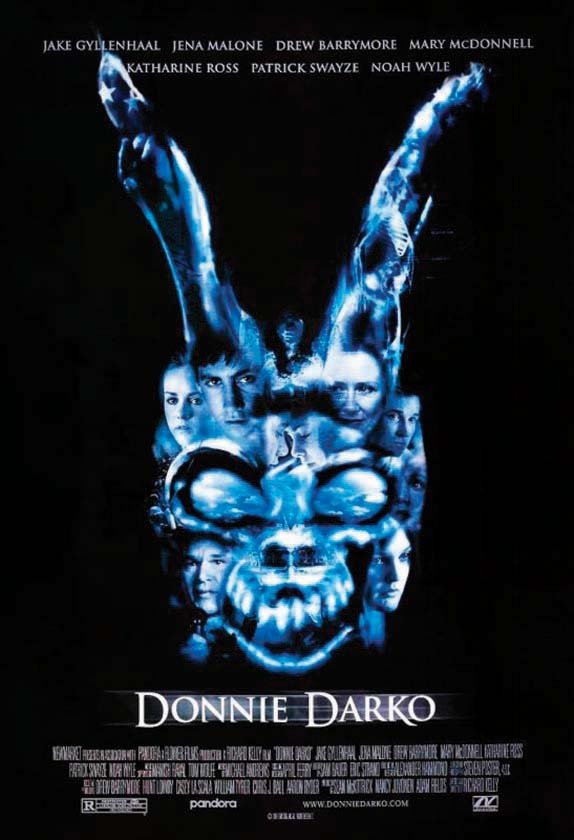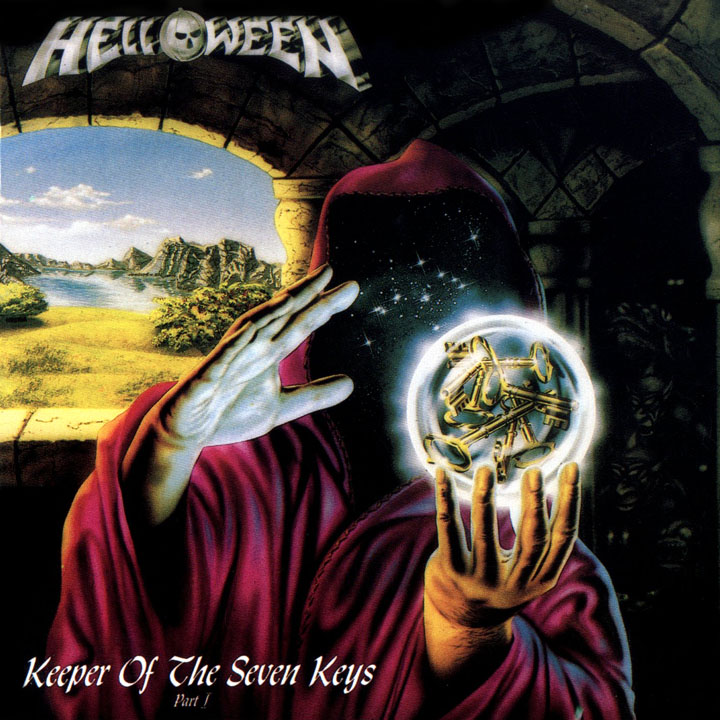 It’s one thing to make a movie that relies on secrets and mysteries, never explaining everything – but then you lose the viewer. Something has to make sense. We get tired of being jerked around. Your movie can’t be the equivalent of a child saying “I know something you don’t know!” for 2 hours. The audience won’t hang around for forever.
It’s one thing to make a movie that relies on secrets and mysteries, never explaining everything – but then you lose the viewer. Something has to make sense. We get tired of being jerked around. Your movie can’t be the equivalent of a child saying “I know something you don’t know!” for 2 hours. The audience won’t hang around for forever.
But the other extreme is equally bad, where a movie anxiously contorts itself into a pretzel trying to “make sense”, killing all imagination and wonder in the process. As the line goes, explaining a joke is like dissecting a frog. You understand it better…but the frog dies.
Donnie Darko somehow combines the bad aspects of both, creating a specious dream narrative burdened that somehow possesses the need to literalize itself with scientific explanation.
The premise is tantalising. A troubled young man is called from his room by a figure in a rabbit suit – this apparent saves his life, for a jet engine crashes into his room as soon as he leaves.
The story soon becomes muddled, and the director’s cut merely shines an extra 10 watt bulb into the murk. Donnie has obviously been saved for a reason…but what? It seems time travel is involved. Something about multiple universes. Donnie travels from place to place at the behest of Mr Rabbit Suit, doing various things, but there’s a layer of confusion preventing them us from seeing the higher purpose. It’s like playing an adventure game when you can’t work out what you’re supposed to do, so you just blindly click on everything in sight.
Donnie Darko has style – all kinds of style. But what, ultimately, is it doing? It’s not a departure into the Land of Lynch – the movie obviously has rules, it’s obviously humming along to some hidden tune we can’t hear. It invites logical analysis…but sadly, logical analysis gets turned away at the door. Sorry sir, you aren’t on the guest list.
It does give an unsatisfying, fairly thin scientific non-explanation for the events in the book. The wonderfully creepy atmosphere is immediately dispersed like fart gas when Donnie starts reading about what’s happening in a helpful textbook called The Philosophy of Time Travel. Stupid. Who thought this was a good idea?
Ultimately, we never know the full story of Donnie’s strange experiences. There are fansites dedicated to explaining this movie, especially its profoundly confusing final scenes. Explanations coil around and around on themselves until you’re left with no choice but to think “why even analyse this? It’s a nonsense. There’s no way, given these facts, to arrive at a consistent conclusion.” Normally you can make any bizzaro version of a theory work by adding enough epicycles and equants, but not here. Where, ultimately, does the aircraft engine come from? The real world, or Donnie’s “tangental” one? Neither makes sense. This movie is impervious to reason.
This movie annoyed me to a degree that probably isn’t healthy. I wonder if the director can furnish answers about this movie. Someone should beat it out of him – my suggestion is with a jet engine.
 This album has one bad song. All the others are so good that I keep giving “A Tale that Wasn’t Right” chance after chance, convinced that I must be missing out on its genius somehow. But it remains a bad song.
This album has one bad song. All the others are so good that I keep giving “A Tale that Wasn’t Right” chance after chance, convinced that I must be missing out on its genius somehow. But it remains a bad song.
The rest of the tracks are classic German speed/power metal, with lots of riffs, huge choruses, and a pleasant sense of camp. Helloween is the band that can take you on a 14 minute progressive metal journey, and midway through, you get a lyrical reference to Charles Schultz’s Peanuts. The band’s childlike naivete and sense of humor is genuinely refreshing, and set them apart from a metal scene that was already becoming laughably self-serious.
Kai Hansen is a dominating songwriting force here. His high speed-cookers “I’m Alive” and “Twilight of the Gods” are very fast, the former more agitated, the latter more ambitious and story-driven. “A Little Time” and “Future World” are catchy midpaced rockers, the latter having its childlike melodies cut with creepy brainwashed lyrics – this isn’t power metal as much as Jim Jones metal.
“A Tale that Wasn’t Right” dull and sloppy, but Michael Kiske’s piercing voice is somewhat a point of interest. “Initiation” and “Follow the Sign” are little filler instrumentals that help add a little atmosphere between tracks. The Keeper albums aren’t concept albums as such, unless it’s possible to be a concept album without a concept. The only thing uniting them is the uniting them is the vaguely Nostradamus-like character of the Keeper, who has all of time and space floating within his cowl.
The final song is “Halloween” (A plus two E’s), an incredible recap of Helloween’s (three E’s) career to date: heavy Anthrax-esque thrash riffs, speedy tremolo picking, what seems to be several dozen harmonised guitar solos smashing together in a musical clown car collision, and Kiske nailing ungodly high notes. An astonishing blizzard of speed and technicality that pretty much set the bar on what’s possible with power metal – and yet the songwriting is clever enough that it can be condensed into a 5 minute single while still making sense.
The songs are great, and the lasting impression is one of grandeur, fun, and nostalgia. Sad, too. The Keeper of the Seven Keys diptych came too late to launch them to stardom. Come another couple of years and they’d be a band in ruins – destroyed from the inside by a depressed drummer and egomaniac singer, destroyed from the outside by the advent of grunge rock. By the time they recovered, the window of opportunity was gone. They’re still battling on, without Kai, Kiske, or Schwichtenberg, but they never regained what they’d had before.
With this album nearly twenty years old, its touching to remember the band that was king, if only for A Little Time.
 This is the kind of game that gets called a “cult classic”. But who wants to be in a cult?
This is the kind of game that gets called a “cult classic”. But who wants to be in a cult?
Released at the eleventh hour of platforming genre, Jazz Jackrabbit 2 sees you controlling the titular character against Devan Shell, a mendacious tortoise who has made the critical mistake of being the villain in a platforming game.
The game takes the concept of the first game and pushes it as far as it will go. Basically, think Sonic, but not as fast. Or think Mario, but a bit more edgy. Visually the game draws heavily from drug-trip psychedelia, and the soundtrack is mostly slap-bass acid funk. JJ2 is basically the hippie era put into a computer game, more so than any other game I know (except maybe Timothy Leary’s Mind Mirror). Jazz doesn’t smoke a bomber joint as part of his idle animation, but I guarantee the artists wanted him to.
You get to play as Jazz or his brother Spaz (Jazz can hover in mid-air like Mario in SMB3, while Spaz can double-jump), collecting jewels and killing enemies with guns, speed-dashes, even your ass (literally). The game simultaneously looks dated yet great. The background is an ever-morphing LSD light show of color, and the lighting effects of muzzle flashes (etc) are simple but dramatic. The hand-drawn sprites are fun and cartoony. You do stuff just to see how the characters will react.
The problem with Jazz Jackrabbit 2 is that it doesn’t seem like much of a game. The single player mode took me about three hours to beat on hard difficulty. The enemies are too easy, and the bosses are rote and predictable – crack the “code” and you can beat them blindfolded and in a body cast. The levels are not very interesting, and don’t invite another play-through.
It does, however, have an extensive multiplayer mode, as well as lavish level-editing and modding tools. Forget Mario or Sonic, this game’s true inspiration is Quake. Epic’s approach was to make a bare-bones product, and throw it over to the fans to put some meat on it. Their bet paid off. JJ2 spawned a community took this game and ran with it, producing all sorts of custom levels, mods, etc, some of which are pretty impressive (tip: download Tomb Rabbit).
The game itself isn’t much. It’s like a shitty movie that has a cult following who analyse every frame. It’s the fans that turned it into a product worth owning – JJ2 isn’t a game so much as a piece of real estate, something that’s only as good as what you’re prepared to do with it.
Don’t get me wrong, there’s a lot of cool stuff in JJ2. But it’s rushed cool stuff, thrown in without much polish or thought. What’s the point of giving the player tons of weapons if most of them are useless? I think I used the pepper spray once and then never touched it again. Even Jazz is pretty useless next to his brother, who can reach all sorts of high places thanks to his double jump. Jazz gets completely upstaged in his own game.
I had some fun with Jazz Jackrabbit 2 back in the day, but I don’t expect to ever play it again. Like the hippie era it pastiches, it came and went, leaving only memories. It still has a dedicated following, but somehow the Kool Aid wasn’t strong enough in my case.
 It’s one thing to make a movie that relies on secrets and mysteries, never explaining everything – but then you lose the viewer. Something has to make sense. We get tired of being jerked around. Your movie can’t be the equivalent of a child saying “I know something you don’t know!” for 2 hours. The audience won’t hang around for forever.
It’s one thing to make a movie that relies on secrets and mysteries, never explaining everything – but then you lose the viewer. Something has to make sense. We get tired of being jerked around. Your movie can’t be the equivalent of a child saying “I know something you don’t know!” for 2 hours. The audience won’t hang around for forever.

